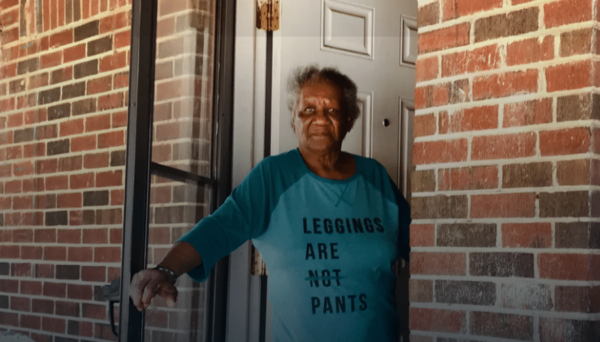An elderly South Carolina woman said she nearly lost it all when the local sheriff’s office tried seizing her home under civil forfeiture, claiming she wasn’t doing enough to keep criminals out of her front yard.
Resident Rozina Javis, who’s in her 80s, has lived in the same Columbia, S.C., home since 1964, The Greenville News reported. That same home has sheltered generations of relatives, a history made apparent by the dozens of family photos gracing her living room wall.

Rozina Javis’ home was faced with the threat of seizure by county authorities because of criminal activity in her front yard. (Photo by The Greenville News)
Years prior, her modest brick abode came under the threat of seizure. David Wilson, the then-Richland County Sheriff’s Department chief deputy, penned a letter to the local grandmother in March 2014, alerting her to “excessive criminal activity” at her address.
The laundry list of offenses, which occurred over an eight-year span in the area near Javis’ home, included narcotics violations, nine assault charges and even a murder back in 2010, according to the newspaper.
“Any further incidents involving illegal drugs/weapons at this property location will result in the immediate seizure of this property under state and federal forfeiture laws,” Wilson wrote. “No further notice will be given.”
Davis nearly became one of thousands in South Carolina who have had their property seized under the state’s civil forfeiture practices, which have disproportionately impacted the state’s Black residents, an ongoing investigation by The Greenville News TAKEN project revealed.
Civil forfeiture is widespread across the United States, with reforms coming slowly in places like Philadelphia, where the city finally agreed to curb the practice last year after seizing approximately 1,200 homes, 3,500 cars and $50 million in cash between 2002 and 2014 alone.
The South Carolina newspaper’s report found that 7 out of 10 people in the state who have seen their property seized are African-American, and 65 percent of all money seized by the police is from African-American males. What’s worse, the state’s Black residents are nearly three times more likely to have their money and property seized than white residents.
The investigation is part of a series examining civil asset forfeitures across South Carolina and how they’ve been used to target and police Black residents. Journalists working on the project estimate that the state’s law enforcement agencies have seized over $17 million in just the last three years.
“This is all I’ve got,” Javis told the newspaper of her home.
The elderly woman called the sheriff’s department and told Wilson she was aware of the criminal activity. Police documents showed that some of Javis’ young relatives would sell crack cocaine out of her front yard.
She told authorities she’d be able to stop the illicit activity during the daytime, however, it would pick back up after she went to bed at 9 p.m., as people would hang around near her home, or on the sidewalks nearby, the deputy police chief’s report explained.
Javis said she had no choice but to hire a lawyer after the sheriff’s department came after her home anyway.
“Your home, that’s the thing that you have, you have (sanctuary) there,” said Javis’ lawyer, Byron Gipson, who accused authorities of using “bullying tactics” against his client. He argued there are a variety of ways to address crime without going after someone’s home.
“That’s the bully approach,” Gipson added. “You can harass or threaten — why don’t you go fix the real problem? You know where this stuff is going on. You try to fix the problem. What the hell is she supposed to do? Is she supposed to put on a cape and go outside and become the caped crusader out here?”
Prosecutors never took Javis to court over the matter, and the case was dropped in 2016, the Greenville News reported.
The grandmother was able to keep her home but ended up filing for bankruptcy. The fight to keep her home simply cost too much, she said.


